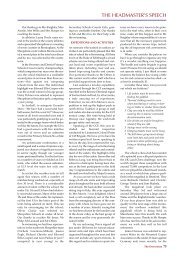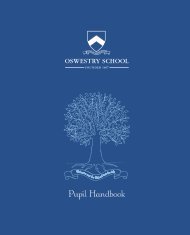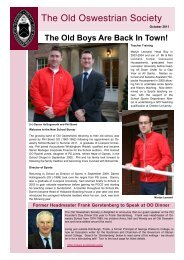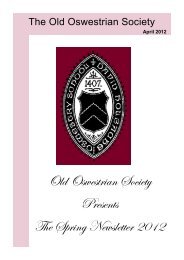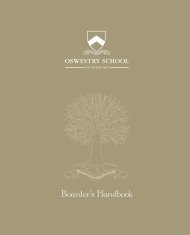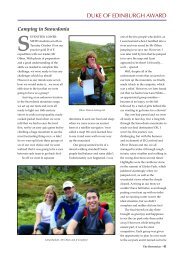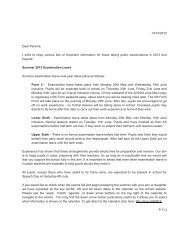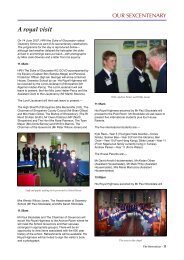Medical Policy - Oswestry School
Medical Policy - Oswestry School
Medical Policy - Oswestry School
Create successful ePaper yourself
Turn your PDF publications into a flip-book with our unique Google optimized e-Paper software.
Health checks and vaccinations.<br />
On admission boarders' parents are asked to complete a questionnaire about the pupils past<br />
medical history. They are asked to sign to give consent for investigations and treatment to<br />
be carried out at the doctor's discretion. Day pupils' parents also are asked to agree to their<br />
child being treated by a <strong>School</strong> Nurse or her deputy during her absence.<br />
Boarders have a health check on admission to the school.<br />
In October the boarders are offered an annual flu vaccination that is also made available to<br />
the staff. Routine travel vaccinations, diphtheria, tetanus and polio vaccines are also offered<br />
by the school.<br />
Confidentiality<br />
The school <strong>Medical</strong> Coordinator and Senior Boarding Staff have a divided loyalty, firstly to<br />
the pupils as patients and secondly to the school. Occasionally conflicts may occur between<br />
maintaining confidentiality and the need for communication of information to those caring<br />
for the pupils. Pupils should be aware that they can discuss any matter with the <strong>Medical</strong><br />
Coordinator or <strong>School</strong> Nurse in complete confidence. Any breach of that confidence would<br />
be discussed with the pupil first and only if it was thought that the health of other pupils in<br />
the school was at risk, or that it was in the pupils own interest to share the information.<br />
Teachers’ responsibilities<br />
Teachers should know of pupils with disabilities that might lead to their being placed at risk<br />
in certain activities. E.g. defects of vision or hearing, epileptics, diabetics, significant<br />
allergies, e.g. Nut allergy. This information is available either in the pupil files or on the PASS<br />
database which is maintained by the Database Manager. Parents are made aware that<br />
details from the medical questionnaire will be passed on to teaching staff on a need to know<br />
basis.<br />
Emergency procedures<br />
In the case of a severe accident or incident at the Senior <strong>School</strong> and Bellan the Community<br />
First Responder should be called, the situation will be assessed and an ambulance called<br />
from there. The casualty will be accompanied to hospital by the <strong>Medical</strong> Coordinator/staff<br />
member or parent if arrived already. At the Prep <strong>School</strong> a first aider would be called, the<br />
situation assessed and an ambulance called, they would be accompanied by a member of<br />
staff. In all cases parents would be contacted as soon as possible.<br />
Infection Control<br />
All trained staff are familiar with normal precautions for avoiding infection. Disposable<br />
gloves are available and care is taken when dealing with spillage’s of blood and body fluids.<br />
In line with the guidance from HPA pupils suffering from diahorrea will be asked not to<br />
return to school until 48 hours from the last episode of diahorrea.<br />
HIV and AIDS<br />
The number of people in the school who will be made aware of a pupil who is infected with<br />
HIV will be rigorously confined to those who need to know in order to ensure proper care of<br />
the child and other pupils. The <strong>School</strong> follows the policy as explained in DfEE document HIV<br />
and AIDS A guide for the education service – facts for teachers, lecturers and youth workers.



